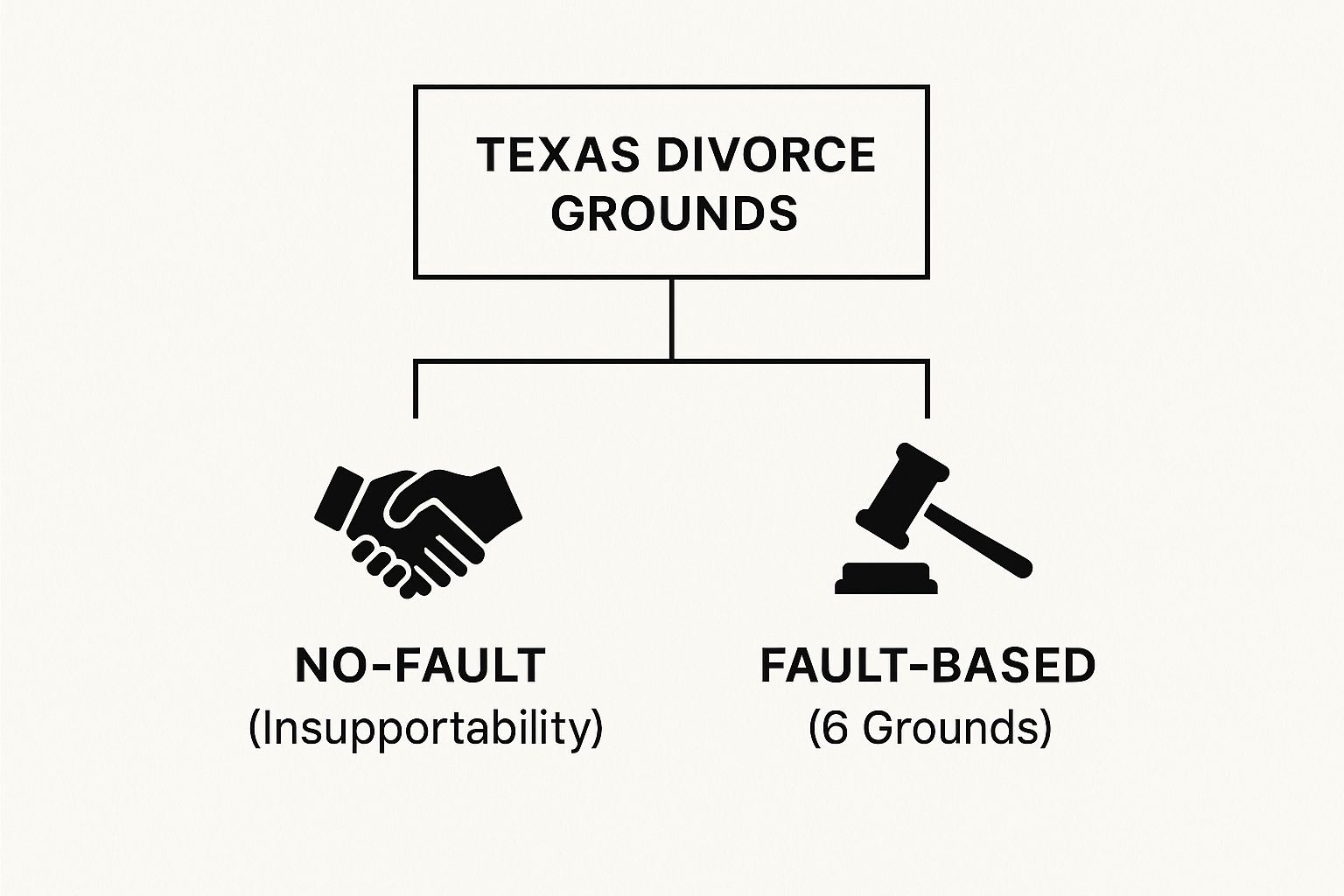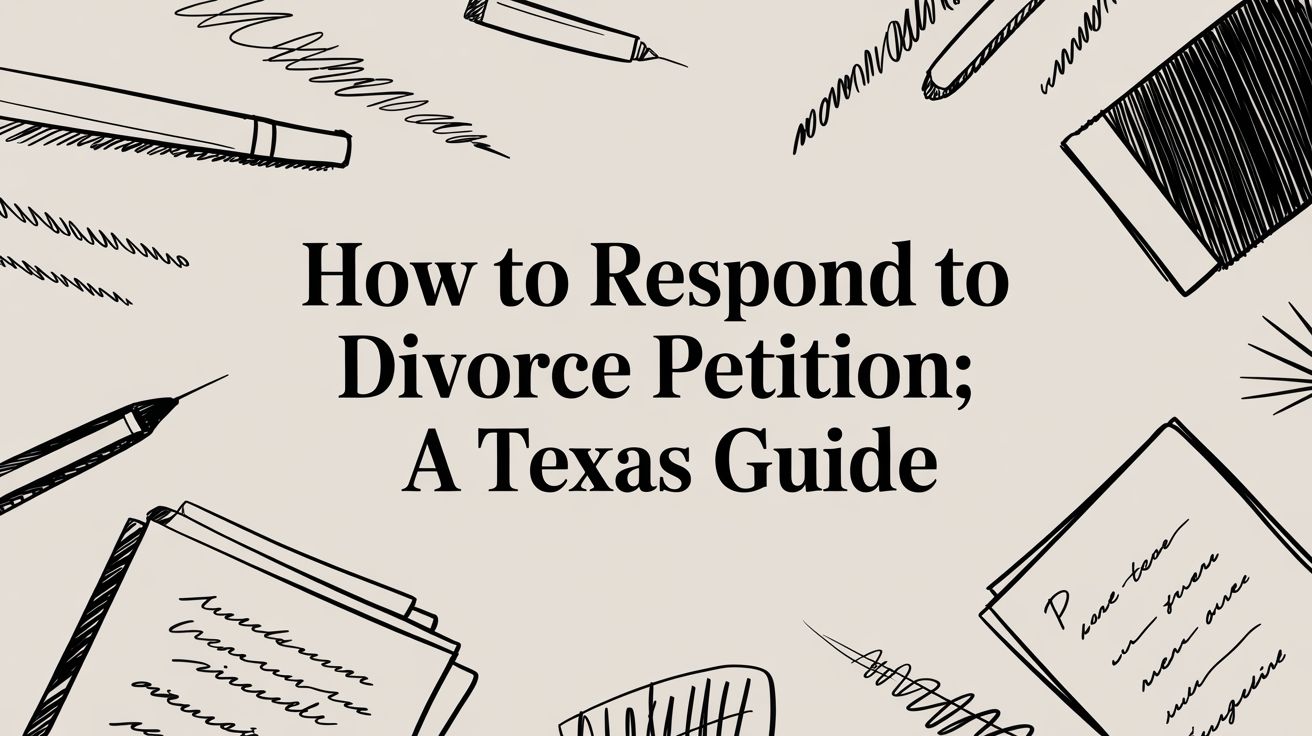Deciding to end your marriage is one of the most difficult and personal choices you will ever make. In Texas, the law requires you to state a legal reason, known as the grounds for divorce, in your initial petition. This isn't just a formality; it's the first official step in your divorce journey, and the choice you make can shape how your entire case unfolds.
Understanding the Legal Foundation for Your Divorce
Facing the possibility of divorce can feel overwhelming, but you don't have to navigate this path alone. This guide is here to bring clarity and empower you, starting with the legal foundations for ending a marriage in Texas. Understanding your options is the first step toward regaining control and moving forward with confidence.
The entire Texas divorce process hinges on a single, critical choice: the grounds you state in your petition. This is more than just checking a box on a form—it's a strategic decision that sets the tone for everything that follows. Your selection determines whether you'll proceed on a "no-fault" basis or a "fault-based" one, and that distinction has significant implications for your future.

Why This First Step Matters So Much
Think of the grounds for your divorce as the story you’re going to tell the court. A no-fault divorce simply tells the judge that the relationship has broken down beyond repair, without pointing fingers. It's a statement that the marriage is over, period.
In contrast, a fault-based divorce alleges that specific actions by your spouse—like cruelty or adultery—directly caused the marriage to fail. This choice can dramatically affect:
- Property Division: Proving your spouse was at fault can lead a judge to award you, the innocent spouse, a larger share of your community property.
- Case Complexity: A fault-based divorce almost always requires more evidence, which can lead to a more contentious, lengthy, and expensive legal process.
- Emotional Toll: Deciding whether to assign blame can have a major impact on the emotional strain you and your family experience.
As you navigate the financial complexities that come with a Texas divorce, you may also need to explore options like loan assumption. Learning more about understanding loan assumption in a divorce can be a helpful resource as you begin to untangle shared assets. Our goal is to replace your feeling of uncertainty with knowledge, helping you make informed decisions from the very beginning.
Understanding No-Fault vs Fault-Based Divorce
When you decide to end a marriage in Texas, one of the first decisions you'll make is how to frame your case. The law gives you two main paths: filing for a no-fault divorce or a fault-based divorce. This isn't just a technicality; it's a strategic choice that sets the tone for your entire divorce process.
The No-Fault Path: Insupportability
The most common and straightforward route is the no-fault divorce. In legal terms, this is called filing on the grounds of insupportability. It’s a simple, blame-free way of stating that your marriage has broken down so completely that there’s no reasonable hope of getting back together. You don’t have to point fingers or prove your spouse did anything wrong.
This approach simply acknowledges a painful truth: sometimes, a marriage just doesn’t work out anymore. It lets you and your spouse move on without dragging the reasons for the breakup into a public courtroom battle.
The chart below breaks down the two main categories for divorce grounds in Texas.

As you can see, while the no-fault option is direct and singular, the fault-based path offers several specific, legally recognized reasons for ending a marriage.
The Alternative Path: Fault-Based Grounds
On the other hand, you can file for a fault-based divorce. This means you’re officially alleging that your spouse’s bad behavior—like adultery or cruelty—is the direct reason the marriage failed. This path is almost always more complicated and emotionally draining, but it can come with significant strategic advantages.
Proving that your spouse is at fault can directly shape the final divorce decree, especially in two critical areas:
- Property Division: A judge can award a larger, or "disproportionate," share of the community property to you if you were wronged.
- Spousal Support: Demonstrating fault can make a stronger case for you to receive spousal maintenance (alimony) and can affect how much you get and for how long.
Choosing this route means you need to be prepared with solid evidence. You aren't just ending a marriage; you're asking the court to hold your spouse accountable for their actions and adjust the final outcome because of them.
Why Most Texans Choose No-Fault
The vast majority of divorce petitions cite insupportability because it allows couples to part ways without the added conflict and expense of proving wrongdoing. It is the most common ground for divorce in Texas.
But here’s a crucial point: even in a no-fault divorce, bad behavior doesn't just get ignored. A judge can still consider evidence of fault when dividing property, even if "insupportability" was the official reason for the divorce. This is exactly why understanding the nuances between these two approaches is so important. For a deeper look at this, check out our guide on no-fault divorce vs. fault-based divorce.
Ultimately, whether you file on no-fault or fault grounds is a strategic decision. It should be made only after you have a clear understanding of your goals, the facts of your case, and the potential outcomes of each path.
A Detailed Look at the Seven Grounds for Divorce
When you file for divorce in Texas, one of the first strategic decisions you’ll make is choosing the legal reason, or “grounds,” for ending your marriage. The Texas Family Code gives you seven distinct options. While the vast majority of people use the simple no-fault ground, it's critical to understand all seven. Each comes with its own set of rules for what you have to prove, and the one you choose can dramatically change the outcome of your case.
This guide will walk you through each of the grounds for divorce in Texas, starting with the most common one and then covering the six "fault-based" reasons. You’ll learn what they mean in plain English, what a judge needs to see as proof, and why it really matters which path you take.

1. Insupportability (No-Fault)
This is the legal term for a no-fault divorce, and it's overwhelmingly the most common path taken in Texas. Why? Because it keeps things simple and avoids turning the courtroom into a battleground over who did what to whom.
Under Section 6.001 of the Texas Family Code, a marriage is considered “insupportable” when there’s so much discord or personality conflict that it has destroyed the relationship. The law also requires that there is no “reasonable expectation of reconciliation.”
In simple terms, it means you and your spouse just can't get along anymore, and there’s zero chance you're getting back together. You don’t have to prove wrongdoing; you just have to state that the marriage is broken beyond repair. This is how most people end their marriage with far less drama and expense.
2. Cruelty
Cruelty is the first of the "fault-based" grounds, and it’s a serious allegation. It means your spouse’s behavior has made living together unbearable. The legal standard, found in Section 6.002, describes conduct that is "of a nature that renders further living together insupportable." This is far beyond occasional arguments or general unhappiness.
To prove cruelty, you need to show a consistent and willful pattern of harmful acts. This could look like:
- Physical abuse or even the threat of violence.
- Persistent emotional or verbal abuse, like constant humiliation, insults, or controlling behavior.
- Financial abuse, such as deliberately cutting off your access to money needed for essentials.
You can't just claim cruelty; you have to prove it with solid evidence. Testimony from friends or family who witnessed the behavior, photos of injuries, police reports, or even a trail of threatening texts and emails can all build your case. A successful cruelty claim can give the judge a very good reason to divide your property unequally.
3. Adultery
Defined in Section 6.003, adultery is when your spouse has voluntary sexual intercourse with someone outside the marriage. While it’s one of the most well-known grounds for divorce, proving it in court requires much more than just a gut feeling or suspicion.
You need clear and convincing evidence. Strong evidence might include:
- Direct evidence: This is extremely rare in divorce cases—things like testimony from someone who actually witnessed the affair.
- Circumstantial evidence: This is far more common. You build a case using puzzle pieces that strongly point to an affair, like incriminating texts, emails, damning social media posts, credit card bills showing hotel stays or expensive gifts, or the findings from a private investigator.
Even if you prove adultery, a judge isn’t required to grant the divorce on those grounds. The court can still grant the divorce based on insupportability. However, the evidence of the affair can still be a powerful tool when arguing for a larger share of the community property.
4. Felony Conviction
If your spouse has been convicted of a felony, you may have grounds for a fault-based divorce under Section 6.004. However, some very specific conditions have to be met.
The law requires your spouse to have:
- Been convicted of a felony offense.
- Been imprisoned for at least one year in a state or federal prison.
- Not been pardoned for the crime.
There’s one more catch: you can’t use this ground if your own testimony is what put your spouse behind bars. It’s a straightforward reason for divorce, but its strict requirements make it relatively uncommon.
5. Abandonment
Also known as desertion, abandonment is another fault-based ground for divorce found in Section 6.005. This happens when one spouse packs up and leaves the other with the clear intention of ending the marriage for good.
To use abandonment as your grounds, you have to prove two key things:
- Your spouse left you voluntarily with the intent to abandon you.
- Your spouse stayed away for at least one full year.
This is more than just a spouse moving out during a separation or while a divorce is in progress. The critical element here is the intent to permanently walk away from the relationship. If your spouse moved out but continued to pay bills or talk about reconciling, proving they intended to abandon you will be difficult.
6. Living Apart
This ground, from Section 6.006, doesn't assign blame like the other fault grounds, but it does come with a strict time requirement. You can get a divorce if you and your spouse have lived in separate households, without cohabitation, for at least three years.
What makes this different from abandonment is that you don't have to prove anyone intended to leave. It's a simple recognition that after such a long separation, the marriage is over in all but name. This is often the ground used by couples who separated years ago but never got around to making the divorce official.
7. Confinement in a Mental Hospital
The final and least common ground is detailed in Section 6.007. You can be granted a divorce if, when you file your petition, your spouse has already been confined to a state or private mental hospital for at least three years.
Additionally, you must show that your spouse's mental disorder is severe and that a relapse is probable, meaning a significant recovery is unlikely. This ground is complex and requires expert medical testimony to prove the severity and long-term prognosis of the mental illness.
Comparing No-Fault and Fault Divorce Grounds in Texas
This table offers a side-by-side look at the primary no-fault option versus the common fault-based grounds. Notice how the burden of proof and potential outcomes shift depending on the reason you choose.
| Grounds for Divorce | What You Need to Prove | Common Evidence | Potential Impact |
|---|---|---|---|
| Insupportability | The marriage is irretrievably broken with no hope of reconciliation. | Your own testimony is typically enough. | Leads to a standard, "just and right" division of property. |
| Cruelty | Spouse's conduct makes living together impossible. | Witness testimony, photos, police reports, texts, emails. | Can lead to a disproportionate (larger) share of community property. |
| Adultery | Spouse had voluntary sexual intercourse with another person. | Texts, emails, PI reports, financial records. | Can influence property division and sometimes alimony decisions. |
| Felony Conviction | Spouse was convicted of a felony and imprisoned for 1+ year. | Official court and prison records. | Can result in a disproportionate property division for the innocent spouse. |
| Abandonment | Spouse left with intent to abandon and was gone for 1+ year. | Testimony showing intent and duration of absence. | Can influence the court to award a larger share of the estate. |
| Living Apart | You and your spouse have lived apart without cohabitation for 3+ years. | Testimony and evidence of separate residences. | Generally results in a standard division of property. |
| Mental Confinement | Spouse has been confined in a mental hospital for 3+ years with a poor prognosis. | Medical records and expert medical testimony. | May impact decisions on spousal support and property division. |
Choosing the right grounds is a critical first step in your divorce. It’s a decision that requires a hard look at the facts of your situation, what you can realistically prove, and what you hope to achieve in the final outcome.
How Proving Fault Can Reshape Your Divorce Outcome
You might be wondering, "Why go through the trouble of proving fault when a no-fault divorce is so much simpler?" It’s a fair question. The answer often comes down to the final judgment. Filing on fault grounds isn't just about setting the record straight; it's a strategic move that asks the judge to consider your spouse's bad behavior when making final decisions. You're connecting their actions to the real-world consequences you’ve had to endure.

This single decision can ripple through the three most critical parts of any divorce: how your property is divided, whether spousal support is awarded, and even who gets custody of your children. Understanding exactly what’s on the line shows why proving fault can be one of the most powerful tools you have to secure your future.
Tilting the Scales of Property Division
Texas is a community property state. That means anything you and your spouse acquired during the marriage is presumed to belong to both of you. The law requires a "just and right" division of that property, which usually starts as a 50/50 split. But proving fault can throw that starting point right out the window.
A "just and right" division doesn't always mean an equal one. Section 7.001 of the Texas Family Code gives judges broad discretion to consider factors like fault in the breakup of the marriage when dividing your assets and debts.
When you prove that your spouse's actions—like cruelty or adultery—harmed you or wasted community funds, the judge gains the power to award a disproportionate share of your marital estate to you, the innocent spouse. Proving fault gives the court a concrete reason to divide the property 60/40, or sometimes even more, in your favor.
For instance, if your spouse drained a joint savings account to fund an affair, that's considered a "fraud on the community." Proving this not only establishes adultery but gives the judge a solid foundation to award you a larger share of the remaining assets to make up for that loss. If you suspect your spouse has been wasting money, it's critical to learn more about how to prove dissipation of assets in a Texas divorce case to protect your financial stability.
The Impact on Spousal Maintenance
Spousal maintenance—what most people call alimony—is never a guarantee in Texas. A judge typically only awards it when one spouse can't meet their "minimum reasonable needs" after the divorce. But proving certain fault grounds can change the game, opening the door to receiving maintenance or influencing how much is paid and for how long.
A conviction for family violence, for example, is one of the specific situations where a judge is explicitly allowed to order spousal support. In the same way, if your spouse's cruelty was so severe that it left you unable to work, that fact becomes a powerful argument for getting the financial help you need to get back on your feet.
Shaping Child Custody Decisions
When it comes to your children, the court has only one guiding principle: the "best interest of the child." A parent's bad behavior doesn't automatically mean they lose custody, but if that behavior could put a child at risk, it becomes a massive factor in the judge's decision.
The court will pay close attention if the fault ground involves any of the following:
- Family violence or cruelty: A documented history of abuse is one of the most compelling reasons for a judge to restrict a parent's access to their child, sometimes ordering supervised visitation.
- Drug or alcohol abuse: If the misconduct is tied to substance abuse that creates an unstable or dangerous home life, it will weigh heavily in any custody determination.
- Felony conviction: A parent being imprisoned for a serious crime directly impacts their ability to provide a safe and stable environment for a child.
In these cases, proving fault isn’t about revenge—it’s about protecting your kids. A judge can use that evidence to grant you the exclusive right to make key decisions about your child’s life or to put safety measures in place, ensuring their well-being comes first.
Practical Steps for Choosing and Proving Grounds
Deciding how to state the reason for your divorce feels like a huge decision, because it is. Let's move away from legal theory and get into practical strategy. Here, we'll break down how to pick the right grounds for your unique situation and what you'll need to do to build a solid case from the very first day.
Making this choice is all about weighing the trade-offs. A no-fault filing is almost always simpler and less hostile, but making a fault-based claim might help you secure a better financial outcome. On the flip side, alleging fault can crank up the conflict, drag out the timeline, and drive up the legal costs of your divorce.
Stating Your Grounds in the Original Petition
Your divorce officially begins when one spouse files an Original Petition for Divorce. This is the legal document where you must formally state the grounds for ending the marriage. The good news is, you aren't locked into just one reason.
It is common practice to file on the primary no-fault ground of insupportability while also including a fault-based ground like adultery as an alternative. This gives you strategic flexibility. If proving adultery becomes too difficult or expensive, you can always fall back on the simpler no-fault claim to get the divorce finalized. Think of this initial filing as setting the stage for the story you intend to prove to the court.
Gathering the Right Evidence for a Fault-Based Claim
If you decide to go the fault-based route, the burden of proof is squarely on your shoulders. You can't just throw out an accusation; you have to back it up with credible, convincing evidence. What you'll need depends entirely on the specific grounds you've chosen.
Here’s a look at the kind of proof that builds a strong case for the most common fault grounds:
- For Adultery: Since catching someone in the act is rare, you'll likely need to build a circumstantial case. This could involve incriminating text messages, emails, photos from social media, or financial records showing suspicious hotel stays, expensive gifts, or trips you didn't know about.
- For Cruelty: Proving a pattern of behavior is key. You can do this with testimony from friends or family who witnessed the abuse, police reports, medical records of injuries, or a documented history of threatening texts and emails.
- For Wasting Assets: If your spouse blew community funds on an affair or a gambling addiction, you'll need the financial paper trail to prove it. Bank statements, credit card bills, and loan documents can clearly show how marital money was misused.
Even if you successfully prove fault, a Texas judge can still grant the divorce on the no-fault ground of insupportability. However, the evidence of that fault can absolutely be used to justify an unequal—or disproportionate—division of your community property in your favor.
The Importance of Professional Help
Gathering this kind of evidence can be a complex and emotionally draining ordeal. In many situations, especially those involving hidden assets or infidelity, trying to do it all yourself is a recipe for frustration. This is where an experienced family law attorney becomes your most important ally.
Sometimes, uncovering the necessary proof requires more than what you can do on your own. Your attorney might recommend bringing in a professional to dig deeper. To see how that works, you can learn more about the role of private investigators in Texas divorce cases. Their expertise can be the key to building a compelling, evidence-backed case that protects your interests and secures your future.
What to Do Next
You’ve done the hard part—you’ve pushed through the legal jargon and now have a solid handle on the landscape of divorce in Texas. You now see the critical difference between a no-fault split and a fault-based divorce, you know the seven specific grounds for divorce in Texas, and you understand how proving fault can completely reshape the outcome for your family.
The most important thing to walk away with is this: choosing your grounds isn't just checking a box on a form. It’s a strategic decision that sets the entire tone for your case. What works for one person’s situation might be the entirely wrong path for you.
While this knowledge is a powerful first step, you shouldn’t have to make these decisions alone. The next move is to apply what you've learned to the unique circumstances of your life and your marriage.
- Clarify Your Goals: Before you do anything else, take some time to think about what you really want. Are you hoping for a quick, amicable separation, or do you need the court to formally recognize your spouse’s behavior to get a fair result?
- Start Organizing: Begin gathering any documents or evidence that might be relevant, especially if you’re leaning toward a fault-based claim. This could be anything from financial records and emails to text messages.
- Get Professional Guidance: The single best way to protect your interests is to sit down with an experienced family law attorney. They can help you weigh the true costs and benefits of each option, looking at your situation from every angle.
Once the divorce is finalized, it's also critical to review and update your personal legal and financial documents. This includes understanding the best estate planning tools, such as a living trust vs. will, to make sure your assets are protected for whatever comes next.
The choices you make now will have a lasting impact, and our team is here to provide the clarity and confidence you need to move forward. The Law Office of Bryan Fagan, PLLC, is dedicated to helping Texas families find clear, confident paths forward. We invite you to schedule a free, confidential consultation with us to discuss your situation and build a strategy that protects you and your family.
Frequently Asked Questions About Texas Divorce
Going through a divorce stirs up a storm of questions, and it’s completely normal to feel like you’re navigating in the dark. Below are some clear, straightforward answers to the questions we hear most often from people in your exact situation.
Can I Get a Divorce if My Spouse Refuses to Agree to It?
Yes, you absolutely can. Texas is a no-fault state, which means only one person has to state that the marriage has become "insupportable" for the divorce to proceed. That's the legal term, but it essentially means the relationship has broken down with no reasonable hope of getting it back on track.
Your spouse cannot legally trap you in a marriage by simply refusing to sign papers or agree to the divorce. While they can't stop the process itself, they can certainly contest the terms—things like how property is divided, who gets custody of the kids, or if spousal support is paid. This can make the divorce longer and more complicated, but it won't prevent it from happening.
Does It Matter Who Files for Divorce First in Texas?
From a practical standpoint, the person who files the initial petition is called the "petitioner," and they get to present their case first if you end up in a courtroom. But in the grand scheme of things, filing first generally has no significant impact on how a judge will ultimately decide your case.
The judge’s decisions will be based on the law, the facts, and the evidence presented—not on who won the race to the courthouse. The strength of your arguments and the clarity of your case are what truly matter.
Is a Fault-Based Divorce Much More Expensive?
It definitely can be, and it’s a major trade-off you need to consider carefully. When you file for divorce on fault grounds, you're taking on the burden of proving that misconduct occurred, and that often requires a much deeper, more expensive legal process.
Here’s a quick look at why the costs can escalate:
- Discovery: This is the formal evidence-gathering phase. It can involve depositions (sworn testimony outside of court), digging through financial records, and other legal tools that rack up attorney hours.
- Expert Witnesses: Proving fault isn't always straightforward. You might need to hire a private investigator to prove adultery or a forensic accountant to trace money your spouse wasted from community funds.
- Increased Conflict: Accusing your spouse of fault cranks up the emotional temperature. This often leads to more heated battles, more court hearings, and fewer chances for a quick, peaceful settlement.
Deciding whether the potential reward of a fault-based claim—like a more favorable property division—is worth the extra financial and emotional cost is one of the most important strategic conversations you'll have with your attorney. It's not a decision to take lightly.
The path through a divorce is lined with critical decisions, and you shouldn’t have to make them alone. At The Law Office of Bryan Fagan, PLLC, our experienced attorneys are here to offer the compassionate guidance and strong representation you need to protect your family and secure your future. We can help you understand all the grounds for divorce in Texas and forge a clear, confident path forward. Schedule your free, confidential consultation with us today.








